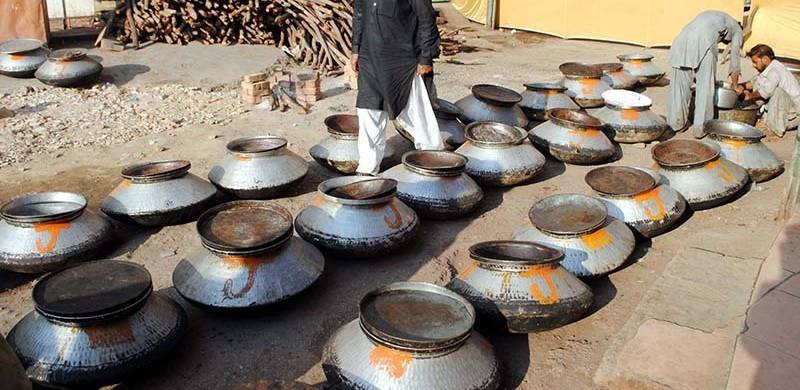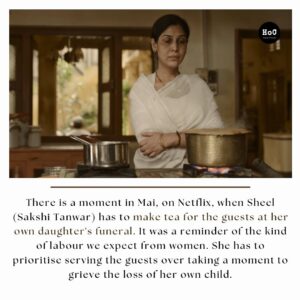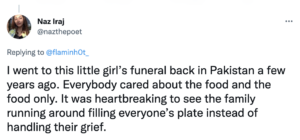
When my paternal grandfather died, I was old enough to have fragmented memories of his death, but young enough so that they remained fuzzy around the edges. But however fuzzy the memory, I can't get the image of the dining table in his house in North Nazimabad, Karachi out of my head. Solid and wooden, I remember it laden with an assortment of jam jars and white bread asphyxiated in plastic wrapping, eggs both cooked and uncooked, a hotpot filled with warm parathas, and an ever present plastic thermos of tea. It was probably wrong of me to be excited at a time when the rest of my family was dealing with death and grief and other then-far removed concerns, but to me, it seemed so wonderful and charming that people brought you so much food when someone in your family died.
Growing up, I would be confused when my friends joked about death and said "When you die, I'll come to your funeral just to eat biryani." What biryani, I wondered? They explained how biryani or pulao or some variation of rice and meat is served at funerals, and were surprised I hadn't known about it. I was surprised too. The only food associated funeral memory I had was the dining table in North Nazimabad, Karachi, when my Dada had died.

The idea of food at funerals might seem strange on the surface, but at its core it is a somewhat well-intentioned attempt, that somehow becomes slightly convoluted during implementation. When someone dies, people know their family is likely going to be overwhelmed with tasks such as making arrangements for the burial, and figuring out transportation. In times of crisis, food becomes inconsequential, and is put on the back burner. And so the community steps in, with aunts, uncles, family friends and community centers offering to take charge of providing food.
Food is often heralded as that magical thing that brings people together, and this is especially true for South Asian cultures. Weddings, births, even casual hang outs are centered around food, and in that atmosphere, why shouldn't death too? But the convolutions! In the absence of a network of well wishers and concerned empaths, the burden of hospitality falls on the grieving household, and there too, usually on the women. In some families, the question of food is outsourced, and orders are placed for big, convenient vats of food that guests can help themselves to. I have even heard of people hiring caterers for the occasion, which makes it hard not to question the compulsions behind such choices.
A couple of months ago an image from a Netflix show called 'Mai' was circulating on Twitter, that touched upon this subject. The main character Sheel, is seen making tea for guests who came to offer condolences on her daughter's death. The image, shared by an Instagram account called Humans of Cinema, was captioned "If a mother has to, as the woman of the house, attend to guests and host them in this manner, does she really have the privilege to be able to mourn her loss?"
 It was re-shared by people on Twitter, and thus began a Twitter argument, as most Twitter arguments tend to begin. Some Indians believed this to be a misrepresentation, saying that Hindu traditions disallow the burning of fire —and hence stoves, somewhere between 3-13 days after a person dies. Certain factions of Islam also have the same belief, going off of the principle that the Quran allows you to mourn for three days, during which you shouldn't be expected to tend to housekeeping matters such as food and laundry. However, it is perhaps telling that most people dismissing this instance happened to be men. And the occasional supportive tweet I saw as a reply to the original, was nearly always from a woman.
It was re-shared by people on Twitter, and thus began a Twitter argument, as most Twitter arguments tend to begin. Some Indians believed this to be a misrepresentation, saying that Hindu traditions disallow the burning of fire —and hence stoves, somewhere between 3-13 days after a person dies. Certain factions of Islam also have the same belief, going off of the principle that the Quran allows you to mourn for three days, during which you shouldn't be expected to tend to housekeeping matters such as food and laundry. However, it is perhaps telling that most people dismissing this instance happened to be men. And the occasional supportive tweet I saw as a reply to the original, was nearly always from a woman.
https://twitter.com/AsmaAzam71/status/1517960999822925825
A quick Twitter search revealed that this isn't just an isolated incident. Somewhere along the way, what started as a well-intentioned act, has resulted in a strange social pressure, not too different from the social more of dowry. Below, some outstandingly shocking examples.
https://twitter.com/abcfucku/status/1355066276629114881

https://twitter.com/AdilQureshi_/status/1166053575648272386
https://twitter.com/EeshaFirdous/status/1062249723720056833
The question of how many people would show up if there was no food may seem exaggerated at first. Surely the food/funeral trauma bond can't be that strong? But a conversation I had with my friend Minahel just this morning reveals otherwise. She told me about her colleague, who is from Abbottabad, and how in his community, there exists an unspoken decades old rule that families must serve mutton at funerals. Having recently lost his mother, the haunting experience of planning funerals was still fresh in his mind. If the grieving family doesn't have the funds to serve mutton, then a local committee that helps out with weddings and funerals might pool in, but usually the expense is borne by the afflicted household.
He said that very recently, after some people complained against this rule, which had started to wear down on people just like dowries do —you can't afford it, you don't want to do it, but people will judge you if you don't— the committee allowed people to serve daal (lentils) instead at funerals, if they wished. Since then, he says there has been a significant decrease in the number of people who show up at funerals, which says a whole lot.
No one understands emotional eating more than I do. And it is unrealistic not to expect some sort of food related occurrence at a gathering of many people. But perhaps it's time to return to the good-natured practice of taking food for grieving families, rather than expecting to be fed by them. Let's allow families, and especially women —who are often thrust back into the role of the caretaker the very next day— the space to grieve and process their loss. Bereavement is hard enough as it is, must we add biryani to the mix?
Growing up, I would be confused when my friends joked about death and said "When you die, I'll come to your funeral just to eat biryani." What biryani, I wondered? They explained how biryani or pulao or some variation of rice and meat is served at funerals, and were surprised I hadn't known about it. I was surprised too. The only food associated funeral memory I had was the dining table in North Nazimabad, Karachi, when my Dada had died.

The idea of food at funerals might seem strange on the surface, but at its core it is a somewhat well-intentioned attempt, that somehow becomes slightly convoluted during implementation. When someone dies, people know their family is likely going to be overwhelmed with tasks such as making arrangements for the burial, and figuring out transportation. In times of crisis, food becomes inconsequential, and is put on the back burner. And so the community steps in, with aunts, uncles, family friends and community centers offering to take charge of providing food.
Food is often heralded as that magical thing that brings people together, and this is especially true for South Asian cultures. Weddings, births, even casual hang outs are centered around food, and in that atmosphere, why shouldn't death too? But the convolutions! In the absence of a network of well wishers and concerned empaths, the burden of hospitality falls on the grieving household, and there too, usually on the women. In some families, the question of food is outsourced, and orders are placed for big, convenient vats of food that guests can help themselves to. I have even heard of people hiring caterers for the occasion, which makes it hard not to question the compulsions behind such choices.
A couple of months ago an image from a Netflix show called 'Mai' was circulating on Twitter, that touched upon this subject. The main character Sheel, is seen making tea for guests who came to offer condolences on her daughter's death. The image, shared by an Instagram account called Humans of Cinema, was captioned "If a mother has to, as the woman of the house, attend to guests and host them in this manner, does she really have the privilege to be able to mourn her loss?"
 It was re-shared by people on Twitter, and thus began a Twitter argument, as most Twitter arguments tend to begin. Some Indians believed this to be a misrepresentation, saying that Hindu traditions disallow the burning of fire —and hence stoves, somewhere between 3-13 days after a person dies. Certain factions of Islam also have the same belief, going off of the principle that the Quran allows you to mourn for three days, during which you shouldn't be expected to tend to housekeeping matters such as food and laundry. However, it is perhaps telling that most people dismissing this instance happened to be men. And the occasional supportive tweet I saw as a reply to the original, was nearly always from a woman.
It was re-shared by people on Twitter, and thus began a Twitter argument, as most Twitter arguments tend to begin. Some Indians believed this to be a misrepresentation, saying that Hindu traditions disallow the burning of fire —and hence stoves, somewhere between 3-13 days after a person dies. Certain factions of Islam also have the same belief, going off of the principle that the Quran allows you to mourn for three days, during which you shouldn't be expected to tend to housekeeping matters such as food and laundry. However, it is perhaps telling that most people dismissing this instance happened to be men. And the occasional supportive tweet I saw as a reply to the original, was nearly always from a woman.https://twitter.com/AsmaAzam71/status/1517960999822925825
A quick Twitter search revealed that this isn't just an isolated incident. Somewhere along the way, what started as a well-intentioned act, has resulted in a strange social pressure, not too different from the social more of dowry. Below, some outstandingly shocking examples.
https://twitter.com/abcfucku/status/1355066276629114881

https://twitter.com/AdilQureshi_/status/1166053575648272386
https://twitter.com/EeshaFirdous/status/1062249723720056833
The question of how many people would show up if there was no food may seem exaggerated at first. Surely the food/funeral trauma bond can't be that strong? But a conversation I had with my friend Minahel just this morning reveals otherwise. She told me about her colleague, who is from Abbottabad, and how in his community, there exists an unspoken decades old rule that families must serve mutton at funerals. Having recently lost his mother, the haunting experience of planning funerals was still fresh in his mind. If the grieving family doesn't have the funds to serve mutton, then a local committee that helps out with weddings and funerals might pool in, but usually the expense is borne by the afflicted household.
He said that very recently, after some people complained against this rule, which had started to wear down on people just like dowries do —you can't afford it, you don't want to do it, but people will judge you if you don't— the committee allowed people to serve daal (lentils) instead at funerals, if they wished. Since then, he says there has been a significant decrease in the number of people who show up at funerals, which says a whole lot.
No one understands emotional eating more than I do. And it is unrealistic not to expect some sort of food related occurrence at a gathering of many people. But perhaps it's time to return to the good-natured practice of taking food for grieving families, rather than expecting to be fed by them. Let's allow families, and especially women —who are often thrust back into the role of the caretaker the very next day— the space to grieve and process their loss. Bereavement is hard enough as it is, must we add biryani to the mix?

